Khan Lee (李崗) is interested in history, but not the kind in textbooks. He wants to know what Taiwan looked like before the Japanese and the Chinese Nationalist Party (KMT) came, and how people ran businesses, went to school or trained an army. In 2008, the film director and producer came across a descendant of Wufeng’s (霧峰) Lin (林) family — one of Taiwan’s five great historic clans — and believed he had found everything he ever wanted to know.
“The family has experienced and survived a tumultuous chapter in modern history. Through it, we can see the changing relations between Taiwan and the rest of the world,” he says.
Five years and more than NT$30 million later, Khan Lee and a top-notch team including five historians released Attabu (阿罩霧風雲). The documentary film, which hit the mainstream market earlier this month, follows the fascinating history of the Lin family, starting from the Qing Dynasty when its founding ancestors migrated to Taiwan. The clan subsequently took root and thrived in Greater Taichung’s Wufeng, called Attabu in the language of Lowland Plains Indigenous Peoples (also known as the Pingpu Aborigines, 平埔族), who inhabited the region before they were killed, displaced or assimilated into Han Chinese society.
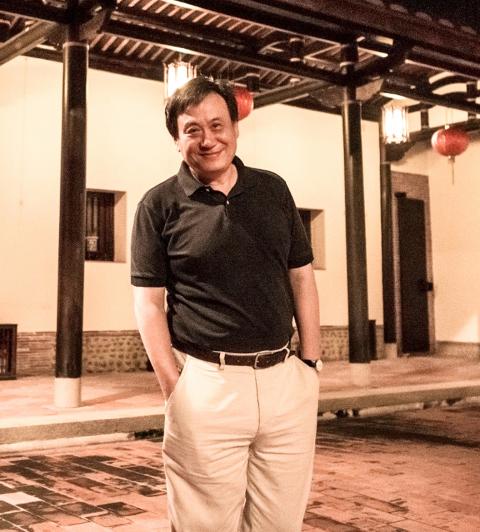
Photo Courtesy of Encore Film
Seeking history
It’s not surprising that the tale of the Lin clan — an immigrant family — strikes a chord with Khan Lee.
He belongs to the so-called Mainlander Second Generation (外省第二代): His father moved to Taiwan with the KMT troops from China after World War II.
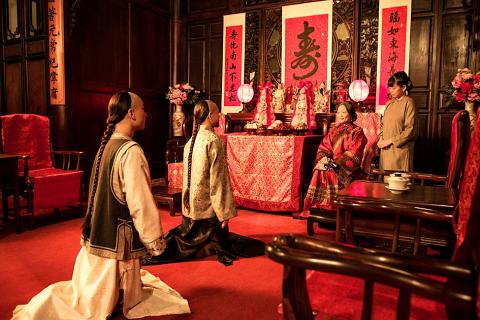
Photo Courtesy of Encore Film
“But I am not going to spend five years making a film about the Lee family in China. I was born and grew up in Taiwan. I want to love Taiwan, but I suffer from amnesia. I don’t remember my history, my home. I need to know exactly what I love,” Khan Lee, the film’s producer, told the Taipei Times.
So Khan Lee studied the Lins.
He compares the clan with the Corleone family in Francis Ford Coppola’s Godfather trilogy, in which the first-generation settlers “needed to kill and fight over resources in order to make a place for themselves in a hostile, foreign land.”
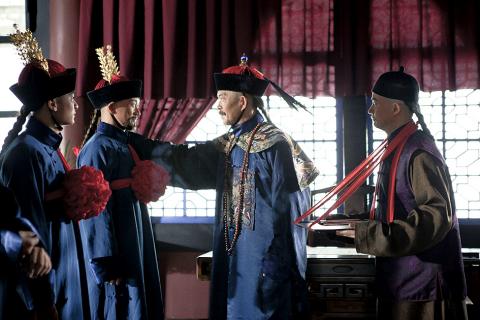
Photo Courtesy of Encore Film
The Lins, however, took their fight for survival to a professional level.
Noted for their military prowess, the militia family was recruited to help suppress the Taiping Rebellion (1850-1864) against the ruling Qing Dynasty.
During the Sino-French War, the Lins were recruited again to Keelung, where they successfully stopped an invasion by the French army. In return, they were awarded titles by the imperial court and tremendous wealth in the form of a camphor monopoly, until the cession of Taiwan to Japan in 1895.

Photo Courtesy of Encore Film
To Khan Lee, Wufeng’s Lin family is the epitome of Taiwan, which is forever caught in between the world’s great powers.
“The family always has to make choices — choices to side with the central government or regional forces, to become Japanese or Chinese, to side with Chinese nationalism or communism,” he notes.
Filling the void
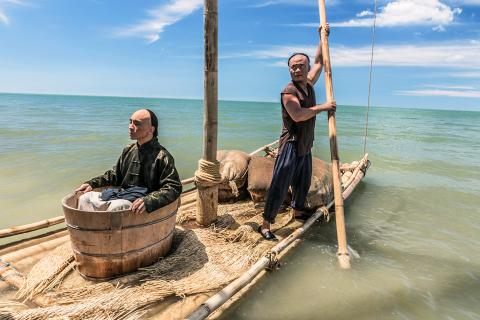
Photo Courtesy of Encore Film
Khan Lee expects the film to face intense scrutiny, not just by clan descendants but also by people in academic and political circles. That’s because Attabu deals with a controversial chapter of Taiwanese history that is often distorted — or altogether ignored — to serve different political interests, he says.
“The KMT doesn’t mention the family because its members were killed during the White Terror era, while the DPP has no interest in the part of Taiwanese history when men wore queues,” he adds. “Meanwhile, the Chinese Communist party makes television drama in which the inhabitants of Taiwan speak with a perfect Beijing accent and love their fatherland.”
In Attabu, Khan Lee tries to depict the era faithfully. Using historically accurate props and costumes, Khan Lee and his team are able to craft meticulous reconstructions of bygone events, allowing viewers to “actually see what Taiwan looked like and then fill in the blanks.”

Photo Courtesy of Encore Film
Early in this process, Khan Lee was saddened to find that Taiwan’s film industry — after two decades of decline — had largely lost the knowledge, skills and talent required to make a convincing historical film. Khan Lee turned to veteran art director Lee Pao-lin (李寶琳), who has mostly worked in China and whose portfolio includes Lust, Caution (色,戒) by Khan Lee’s older brother, Ang Lee (李安). Lee Pao-lin helped decide how the buildings, people and the surroundings should look in the Taiwan of over a century ago. Every prop was made by a team in Beijing and shipped back to the Taiwanese crew as a loan.
“It is truly tragic when a place can’t even tell its own story,” Khan Lee laments. “Wei Te-sheng (魏德聖) certainly wouldn’t have had to spend NT$700 million to make Seediq Bale if we still had the knowledge and skills.”
With the release of Attabu, Khan Lee wishes to attract enough funding to complete the second part of the project, which tells the story of the Lins under Japanese rule and after the arrival of the KMT.
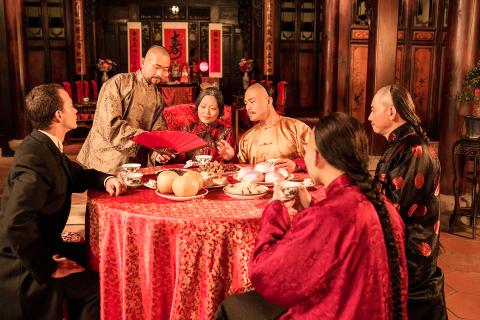
Photo Courtesy of Encore Film
“I was 51 years old when I first started the project. Now I am 56,” Khan Lee says, “I feel an anxious need to speed up and tell our own stories. Otherwise, they may be lost forever or told by others who will interpret our history differently.”

In the March 9 edition of the Taipei Times a piece by Ninon Godefroy ran with the headine “The quiet, gentle rhythm of Taiwan.” It started with the line “Taiwan is a small, humble place. There is no Eiffel Tower, no pyramids — no singular attraction that draws the world’s attention.” I laughed out loud at that. This was out of no disrespect for the author or the piece, which made some interesting analogies and good points about how both Din Tai Fung’s and Taiwan Semiconductor Manufacturing Co’s (TSMC, 台積電) meticulous attention to detail and quality are not quite up to

April 21 to April 27 Hsieh Er’s (謝娥) political fortunes were rising fast after she got out of jail and joined the Chinese Nationalist Party (KMT) in December 1945. Not only did she hold key positions in various committees, she was elected the only woman on the Taipei City Council and headed to Nanjing in 1946 as the sole Taiwanese female representative to the National Constituent Assembly. With the support of first lady Soong May-ling (宋美齡), she started the Taipei Women’s Association and Taiwan Provincial Women’s Association, where she

It is one of the more remarkable facts of Taiwan history that it was never occupied or claimed by any of the numerous kingdoms of southern China — Han or otherwise — that lay just across the water from it. None of their brilliant ministers ever discovered that Taiwan was a “core interest” of the state whose annexation was “inevitable.” As Paul Kua notes in an excellent monograph laying out how the Portuguese gave Taiwan the name “Formosa,” the first Europeans to express an interest in occupying Taiwan were the Spanish. Tonio Andrade in his seminal work, How Taiwan Became Chinese,

Mongolian influencer Anudari Daarya looks effortlessly glamorous and carefree in her social media posts — but the classically trained pianist’s road to acceptance as a transgender artist has been anything but easy. She is one of a growing number of Mongolian LGBTQ youth challenging stereotypes and fighting for acceptance through media representation in the socially conservative country. LGBTQ Mongolians often hide their identities from their employers and colleagues for fear of discrimination, with a survey by the non-profit LGBT Centre Mongolia showing that only 20 percent of people felt comfortable coming out at work. Daarya, 25, said she has faced discrimination since she